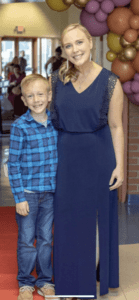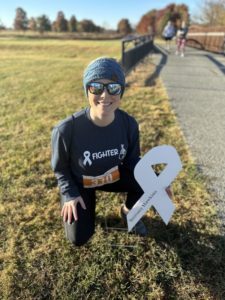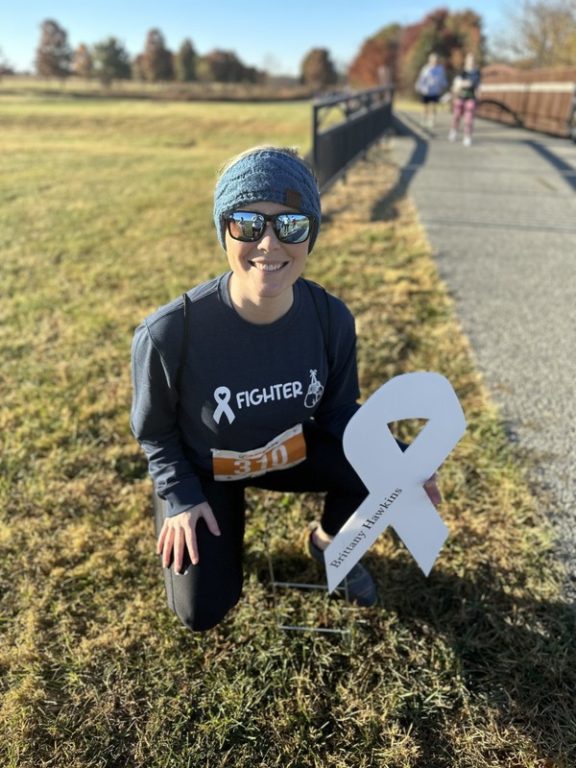Before you read further, make sure to check out Part 1 of our interview, where Brittany discusses what non-small cell lung cancer (NSCLC) is, her diagnostic journey, and how she learned that her cancer was RET+. Today, we learn more about RET+ NSCLC, explain what biomarker testing is, and offer insight into being your best advocate.
Learning about RET+ NSCLC
There are several forms of lung cancer that result from gene mutations, such as EGFR and ALK+. But people with RET+ NSCLC only make up about 1-2% of the entire NSCLC population. Brittany shares:
“My doctor had a couple of other young lung cancer patients but nobody else with RET. He is a researcher by nature and loves a challenge, so I knew I was in good hands. Educationally, I felt like we were in the same boat and I ended up doing a lot of my own research. But I didn’t know where to start. I hadn’t even heard terms like EGFR or RET+ before. Kentucky is a big tobacco state so a lot of the research around lung cancer centers around cancer from smoking. There’s not much education or awareness around those with lung cancer who are non-smoking.”
With nowhere else to turn, Brittany turned to her support system: her husband, family & friends. One aunt directed Brittany to various online support groups and Facebook communities. These communities have been impactful in supporting her as she navigated this difficult journey. She explains that one such community is rather small (around 250 people) and they have lost members along the way. However, together, they’re all able to rally around each other for the same fight. While sometimes brutally sorrowful, this community provides motivation to continue fighting for awareness, funding, and more research.

As Brittany has continued to learn more about RET+ NSCLC, she discovered that there were treatment options available to her in the form of two FDA-approved drugs – Gavreto and Retevmo.
What is Biomarker Testing?
The National Cancer Institute (NCI) explains that biomarker testing is:
a way to look for genes, proteins, and other substances (called biomarkers or tumor markers) that can provide information about cancer. Each person’s cancer has a unique pattern of biomarkers [and] some biomarkers affect how certain cancer treatments work.
Brittany continues:
“When I’m explaining biomarker testing, I usually start with liquid biomarker testing. It’s just a blood draw and then they test that for every possible biomarker or mutation. But in some cases, like mine with the blood or the bone testing, the biomarker doesn’t show so they have to dig deeper.”
Throughout the past year, Brittany has worked to share information on biomarkers – especially RET – with those around her. Because of her professional work, she spends a lot of time with providers. They often ask questions when they find out about her condition. Brittany shares:
“NSCLC is more widely known, but the non-smokers and mutations kind of baffle people. Just recently, I spoke with a 30-year-practicing cardiologist who had never seen anybody with my condition. These doctors do research and come back for my perspective.”
In addition to raising awareness around biomarkers within the medical community, Brittany also tries to share more information with other patients. She explains that sometimes, in her communities, people state that their tests are ‘inconclusive.’ Brittany says:
“When people say that I want to tell them – pursue another doctor. Don’t stop after the liquid biopsy. If my doctor had stopped, I wouldn’t be here. We can’t rely only on those blood tests but dig deeper when there is no known cause. Look into biopsying the actual tumor. These are all things that, at the time of my diagnosis, I didn’t know. So, I understand that patients who are newly diagnosed don’t know what to ask. But you have to educate & advocate for yourself.”
Advocacy (and How to Advocate for Yourself)
So how can people better advocate for themselves and their care? The first way, Brittany says, is education – making sure that you find and check the accuracy of information about your disease, and finding a community of people in the same boat. What are your options? What is your prognosis? She shares that much of what she’s learned is because of people who have been on the journey longer than her. Moreover, Brittany is grateful not only for their insights, but for the advancements in medicine.
Another way to advocate for yourself, Brittany says, is to partner with your medical team but not solely rely on them to make decisions. She says:
“I’m not afraid to question my doctor. He hasn’t steered me wrong yet, but we’ve had many conversations about what’s next and how to prepare for that. The two drugs aren’t going to last forever. My cancer will figure out how to grow around that and we’ll be at the mercy of research. So we need to have a lot of conversations about what we can do now, whether I could join a trial, or what the next steps are.”

Outside of personal advocacy, Brittany also encourages people to get involved with larger advocacy and awareness. She has personally worked with the RET positive community to help patients become more comfortable sharing their stories. Additionally, she has worked closely with Breath of Hope KY: raising funds, selling awareness t-shirts, donating to lung cancer research, and running a 5K. One of the goals of her advocacy work is fighting the stigma of lung cancer:
“We want people to know that lung cancer is not just a smoker’s disease. Lung cancer is the type of cancer people think they can prevent. In terms of national research and funding, lung cancer isn’t forgotten but it does get passed over a lot because people aren’t aware that patients don’t do this to themselves. That stigma goes so far that we have a subconscious mindset we need to fight. We want to share that #AnyoneWithLungs can get lung cancer.
If you want to get involved in advocacy, how can you get started? Perhaps the most important element is just learning how to reach out. Make it known that you want to get involved. The diagnosis portion of the journey, and the information overload, can be difficult to grapple with. But if you want to get involved in advocacy, don’t be afraid to reach out and say: “I’m passionate about making a difference. How can I help?”
Advice for the Newly Diagnosed
Finding a community is one of the most important pieces of advice that Brittany can offer to others, whether they are just beginning their lung cancer journey or whether they are further into it.
“Find your people. Surround yourself with a community. Ask for things. Put your journey out there and don’t be afraid to ask for help. It can be difficult. But I know I have people who are thinking of me, praying for me, and sending me encouragement. A close friend created a Facebook group for me for support. Because of this, people with chronic coughs have gone and gotten tested. They said following my journey has helped them to better advocate for themselves. It takes time to be comfortable and let others help you, but if you do, you might be surprised by how many people have your back.”
Outside of finding a community, Brittany also shares the importance of finding comfort and support within yourself. At the very start of her journey, she was emotionally in shock. There were some days, after having blood clots, where she felt like she didn’t want to fight anymore. She reminds people that it’s okay to have bad days and to feel sad. However:
“Don’t get stuck in those ‘I don’t want to do this’ moments. You have to enjoy what you have because you’ve been gifted this extra time with life, but you also have to be aware of the reality and planning ahead. Everyone is living life on a ticking time bomb. I’m just aware of mine. If everybody lived a little more aware that nobody is given tomorrow, life would be more fulfilling for everyone. So go out and live. You’re not doing all of this work just to be in a bubble. And me? I feel better now than I ever did before my diagnosis.”
Through this brutally humbling journey, Brittany remains thankful that she gets to spend more time with her husband of 13 years and their 7-year-old son. Thankful that she was diagnosed at a moment in time when treatment was available to her; thankful that she is at this point, ready and able to raise awareness and support others; thankful for today.





